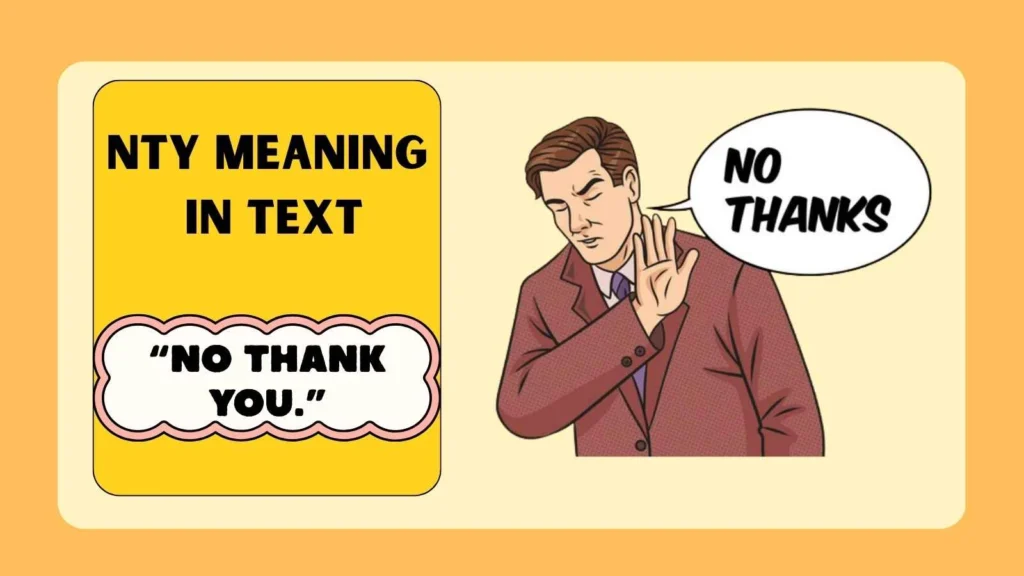Last updated on October 1st, 2025 at 09:24 am
If you’ve ever been texting or chatting online and suddenly spotted the acronym NTY, you’re not alone. In today’s fast-paced digital world, abbreviations are everywhere, and this three-letter shorthand is no exception.
Many people encounter NTY in casual messages, social media comments, or even online games and wonder what it really means.
Understanding it is essential for keeping up with modern texting trends and avoiding awkward misunderstandings. NTY isn’t just a random set of letters—it carries a clear message that’s quick and easy to type.
Whether you’re a Gen Z texter, a Millennial navigating dating apps, or simply someone trying to decode today’s slang, this guide breaks down everything you need to know.
From its definition to how it’s used in different contexts, here’s your complete crash course on NTY and why it’s trending.
Definition & Meaning
The term NTY is a widely used acronym in texting and online conversations that stands for “No Thank You.” It’s a polite yet brief way of declining an offer, invitation, or suggestion without typing the full phrase.
For example, if a friend asks, “Want to join a late-night gaming session?”, you can simply reply with NTY to signal a friendly refusal.
- Polite shortcut: NTY softens a rejection compared to a blunt “No.”
- Speedy response: Perfect for quick chats when you don’t have time to write a full sentence.
- Tone matters: While NTY is generally polite, using it without emojis or context might come across as curt.
Background & History
Texting shorthand like NTY emerged in the early days of instant messaging and online gaming, where speed and character limits mattered. As mobile texting grew in the late 2000s, users began shortening common phrases to save time.
NTY became popular alongside other abbreviations like BRB (Be Right Back) and TTYL (Talk To You Later).
- Early origins: NTY appeared in online gaming forums and IRC chatrooms.
- Mainstream adoption: By the mid-2010s, NTY was common on SMS and social apps like WhatsApp and Snapchat.
- 2025 relevance: NTY remains a staple of casual texting, proving that some acronyms outlast fleeting slang trends.
Usage in Various Contexts
NTY fits seamlessly into everyday conversations where brevity matters.
- Friend chats: Declining food invites, gaming sessions, or party plans.
- Shopping offers: Responding to online deals, marketing texts, or unwanted promotions.
- Dating apps: Politely turning down a match’s invitation without sounding harsh.
Example: “Hey, want to hang out later?” → “NTY, maybe next time!”
Common Misconceptions & Clarifications
Despite its simplicity, NTY can sometimes cause confusion.
- Not rude: Some people mistake NTY for being cold, but it’s meant to be polite.
- Not slang for anything else: NTY strictly means “No Thank You,” not a hidden code or secret meaning.
- Context counts: Pairing NTY with an emoji or extra words (“NTY, I’m busy 😊”) softens the tone.
Similar Terms & Alternatives
If NTY feels too brief, you can use:
- No Thanks – Slightly longer but still casual.
- Nah – Informal and playful, often used with friends.
- I’m good – A friendlier alternative with a positive vibe.
How to Respond to This Term
When someone sends NTY, a simple acknowledgment is enough.
- Reply with “Okay!”, “No problem!”, or “Got it!”
- Avoid pressuring them to explain—it’s meant to end the conversation politely.
Regional or Cultural Differences
NTY is universally recognized in English-speaking countries but might not be as common in regions where English texting slang isn’t dominant.
In international chats, some users may prefer full phrases like No Thank You to avoid confusion.
Comparison with Similar Terms
NTY is often compared with other refusal acronyms:
- NVM (Never Mind): Cancels a request rather than declining an offer.
- NOPE: More playful but less polite.
- IDC (I Don’t Care): Expresses disinterest rather than a refusal.
Usage in Online Communities & Dating Apps
On platforms like Tinder, Bumble, Discord, or Reddit, NTY signals a quick but polite rejection.
For example, a gamer might type “NTY” to decline a raid invite, while a dating app user might send it to turn down a meetup.
Its brevity keeps interactions respectful while avoiding unnecessary explanations.
Hidden or Offensive Meanings
Unlike some acronyms with double meanings, NTY has no offensive or hidden connotations. It’s strictly a polite refusal.
However, a blunt NTY without context can feel dismissive if the recipient expects a warmer reply.
Suitability for Professional Communication
While NTY is perfect for casual texting, it’s not recommended in professional emails, workplace chats, or formal messages.
In those settings, always write the full phrase “No, thank you” to maintain professionalism.
FAQs:
What does NTY stand for?
It means No Thank You, a polite way to decline quickly.
Is NTY rude?
Not at all—it’s a friendly, time-saving refusal.
Can I use NTY at work?
Only in casual internal chats; use full words in formal emails.
Is NTY common on dating apps?
Yes, it’s a respectful way to decline a date or conversation.
Does NTY have any hidden meaning?
No, it simply means No Thank You, nothing more.
How can I soften NTY?
Add an emoji or a short phrase, like “NTY 😊” or “NTY, maybe next time.”
Conclusion:
In a world where speed and clarity rule texting culture, NTY is a polite, efficient way to decline without overexplaining.
Whether you’re chatting with friends, interacting on social platforms, or navigating dating apps, this acronym helps you communicate boundaries quickly and respectfully.
Just remember to pair it with the right tone or emoji when needed—and save the full No Thank You for professional settings.
